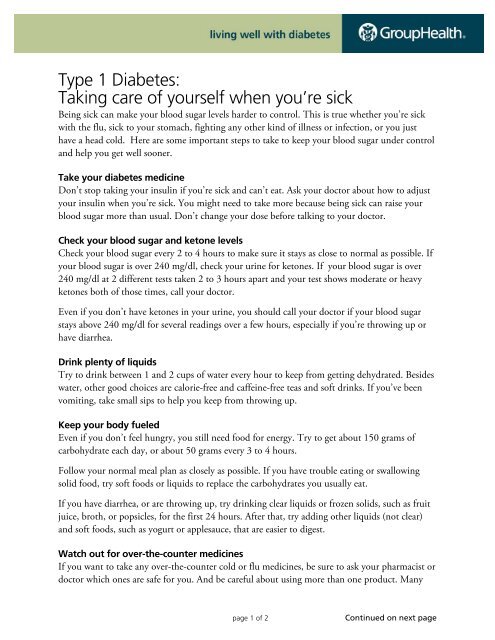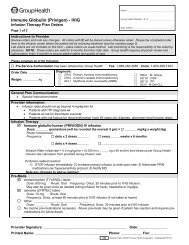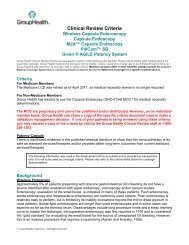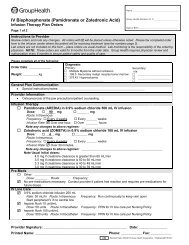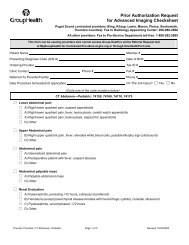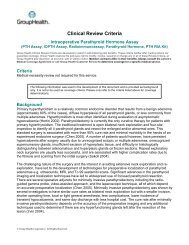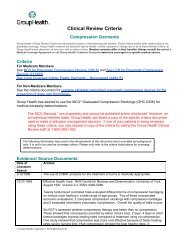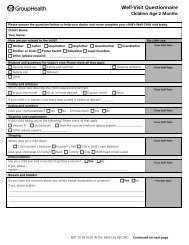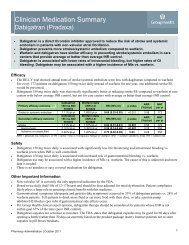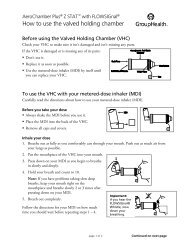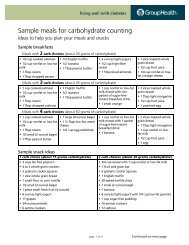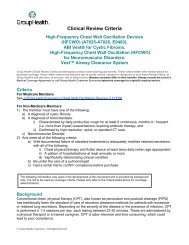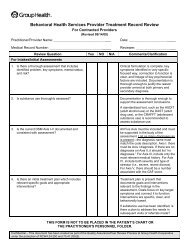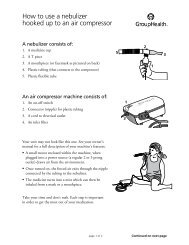Type 1 diabetes: taking care when sick - Group Health Cooperative
Type 1 diabetes: taking care when sick - Group Health Cooperative
Type 1 diabetes: taking care when sick - Group Health Cooperative
Create successful ePaper yourself
Turn your PDF publications into a flip-book with our unique Google optimized e-Paper software.
<strong>Type</strong> 1 Diabetes:Taking <strong>care</strong> of yourself <strong>when</strong> you’re <strong>sick</strong>Being <strong>sick</strong> can make your blood sugar levels harder to control. This is true whether you’re <strong>sick</strong>with the flu, <strong>sick</strong> to your stomach, fighting any other kind of illness or infection, or you justhave a head cold. Here are some important steps to take to keep your blood sugar under controland help you get well sooner.Take your <strong>diabetes</strong> medicineDon’t stop <strong>taking</strong> your insulin if you’re <strong>sick</strong> and can’t eat. Ask your doctor about how to adjustyour insulin <strong>when</strong> you’re <strong>sick</strong>. You might need to take more because being <strong>sick</strong> can raise yourblood sugar more than usual. Don’t change your dose before talking to your doctor.Check your blood sugar and ketone levelsCheck your blood sugar every 2 to 4 hours to make sure it stays as close to normal as possible. Ifyour blood sugar is over 240 mg/dl, check your urine for ketones. If your blood sugar is over240 mg/dl at 2 different tests taken 2 to 3 hours apart and your test shows moderate or heavyketones both of those times, call your doctor.Even if you don’t have ketones in your urine, you should call your doctor if your blood sugarstays above 240 mg/dl for several readings over a few hours, especially if you’re throwing up orhave diarrhea.Drink plenty of liquidsTry to drink between 1 and 2 cups of water every hour to keep from getting dehydrated. Besideswater, other good choices are calorie-free and caffeine-free teas and soft drinks. If you’ve beenvomiting, take small sips to help you keep from throwing up.Keep your body fueledEven if you don’t feel hungry, you still need food for energy. Try to get about 150 grams ofcarbohydrate each day, or about 50 grams every 3 to 4 hours.Follow your normal meal plan as closely as possible. If you have trouble eating or swallowingsolid food, try soft foods or liquids to replace the carbohydrates you usually eat.If you have diarrhea, or are throwing up, try drinking clear liquids or frozen solids, such as fruitjuice, broth, or popsicles, for the first 24 hours. After that, try adding other liquids (not clear)and soft foods, such as yogurt or applesauce, that are easier to digest.Watch out for over-the-counter medicinesIf you want to take any over-the-counter cold or flu medicines, be sure to ask your pharmacist ordoctor which ones are safe for you. And be <strong>care</strong>ful about using more than one product. Manypage 1 of 2Continued on next page
cold and flu medicines have added sugars. They can also interact with one another, and withother medicine you’re <strong>taking</strong>.Plan aheadDon't wait until you're <strong>sick</strong> to get the test supplies you'll need. You can get <strong>sick</strong> day supplies fora small cost from your <strong>Group</strong> <strong>Health</strong> pharmacy and make a kit to have on hand. Be sure tocheck expiration dates and replace as needed. Ask your pharmacist for any of the followingsupplies, if you don’t already have them on hand: Glucose tablets in case you get low blood sugar and can’t eat Thermometer to check your temperature Keto-stix, to check your urine for ketones Glucose meter to check blood sugar levels Test strips for the meter. When you open a new test strip vial write the date on theoutside. Most test strips need to be thrown out 3 months after opening. Lancing device and lancets to prick your finger Insulin (like aspart-Novolog) & syringes to help lower blood sugar levels quickly Glucagon® kit for emergency low blood sugarsWhen to callCall your doctor or <strong>Group</strong> <strong>Health</strong> Consulting Nurse Service if:• You aren’t sure how to take <strong>care</strong> of yourself• You’ve been throwing up or have had diarrhea for more than 6 hours• You’ve been <strong>sick</strong> or have had a fever for more than one day and aren’t getting better• You feel like you’re going to faint, even though you’ve been drinking enough liquids• You have signs of being dehydrated, such as dry tongue, dry or cracked lips• You have trouble breathing or your chest hurts• Your blood sugar levels are unexpectedly high (300 mg/dl or higher) and stay that way forseveral hours, especially if you’re also throwing up or have diarrhea.Information to give <strong>when</strong> you call: How long you’ve been <strong>sick</strong> and what your symptoms are What medicines you’ve taken and how much Your blood sugar tests – the times and results What you’ve had to eat or drink and whether or not you’ve been able to keep it down What your temperature readings have been and <strong>when</strong> you took them<strong>Group</strong> <strong>Health</strong> Consulting Nurse Service:• Call 24 hours a day: toll-free 1-800-297-6877For more information about <strong>diabetes</strong> and other health topics, visit the <strong>Health</strong> and Wellness Resourcessection on the <strong>Group</strong> <strong>Health</strong> Web site at www.ghc.orgRev. date 2009265DA-1558-3 page 2 of 2 © 2009 <strong>Group</strong> <strong>Health</strong> <strong>Cooperative</strong>PHER


